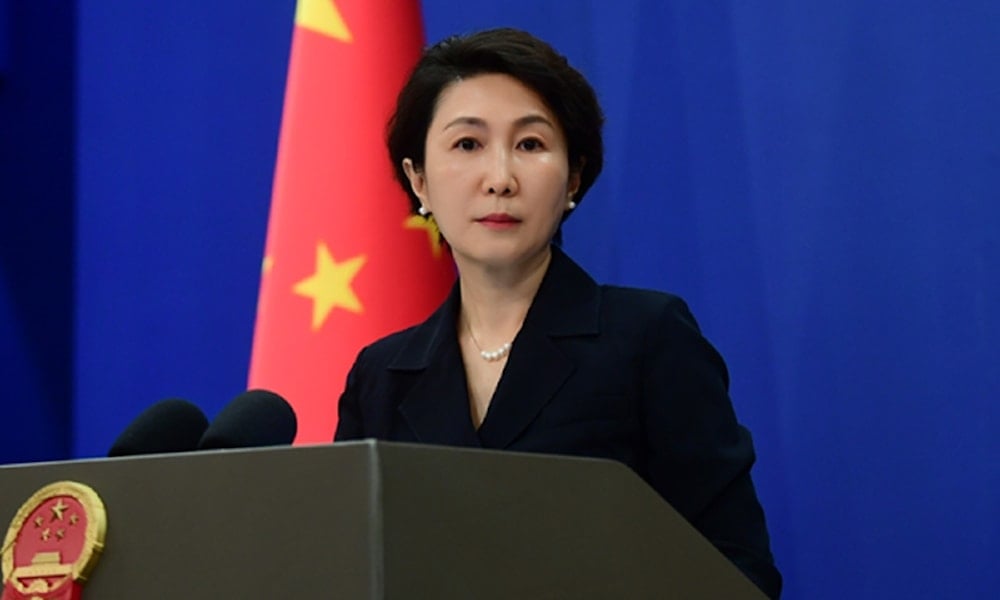China slams Japan's planned missile deployment near Taiwan
China has condemned Japan’s plan to deploy missiles near Taiwan, accusing Tokyo of fueling regional instability and reviving militaristic ambitions following recent comments by Prime Minister Sanae Takaichi.
-

Chinese Foreign Ministry Spokesperson Mao Ning during her regular press conference on November 19, 2025. (China MFA)
China has sharply criticized Japan’s decision to move ahead with missile deployments near Taiwan, warning that the plan represents a dangerous shift in Tokyo’s regional posture.
The move forms part of a broader military buildup across Japan’s southwestern island chain, which includes upgraded long-range missile programs and expanded Self-Defense Forces infrastructure aimed at reinforcing deterrence around the Taiwan Strait.
At a press briefing on Monday, Foreign Ministry spokesperson Mao Ning said that Tokyo’s intention to place medium-range missiles on Yonaguni Island, roughly 110 kilometers from Taiwan, amounts to "a deliberate attempt to escalate regional tensions and provoke military conflict."
Her remarks follow a Japan Times report quoting Defense Minister Shinjiro Koizumi, who confirmed that the deployment remains a government priority.
The Yonaguni installation aligns with Japan’s accelerated defense strategy, which seeks to bolster air and maritime denial capabilities along the Nansei island chain bordering Taiwan.
Link to Takaichi’s Taiwan Remarks
Mao linked the issue to recent comments by Japanese Prime Minister Sanae Takaichi, saying that "given [Japanese] Prime Minister Sanae Takaichi's erroneous remarks on Taiwan, this move is highly dangerous and demands heightened vigilance from neighboring countries and the international community."
She further accused influential groups within Japan of steering the country away from its postwar commitments.
According to Mao, right-wing forces are "sliding further toward militarism and dragging Japan and the region toward disaster."
Beijing Warns Against Historical Revisionism
Beijing stressed that efforts to revive pre-1945 political orientations will face resistance, stating that China "will never allow Japanese right-wing forces to reverse history, nor tolerate foreign interference in Taiwan affairs or a resurgence of Japanese militarism," adding that "China has both the determination and capability to defend its national territorial sovereignty."
Chinese officials have warned that the missile deployment reflects Washington’s long-running attempts to manipulate the region’s security order and contain China under the guise of alliance cooperation.
The diplomatic row intensified after Takaichi said on November 7 that a possible Chinese attack on Taiwan would create a "survival-threatening situation," obliging Japan to take action.
Those remarks drew criticism not only from Beijing but also from opposition parties inside Japan, who accused the prime minister of escalating tensions and blurring constitutional limits on the use of force.
Diplomatic fallout and new countermeasures
In response to the escalating dispute, the Chinese Foreign Ministry summoned Japan’s ambassador, Kenji Kanasugi.
Deputy Foreign Minister Sun Weidong issued a serious protest over Takaichi’s position, while authorities also advised Chinese nationals to avoid traveling to Japan amid the tensions.
The dispute has since expanded beyond diplomacy, with China tightening scrutiny on certain Japanese imports, suspending cultural exchanges, and signaling that further countermeasures may follow if Tokyo proceeds with its plans on Yonaguni.

 3 Min Read
3 Min Read








